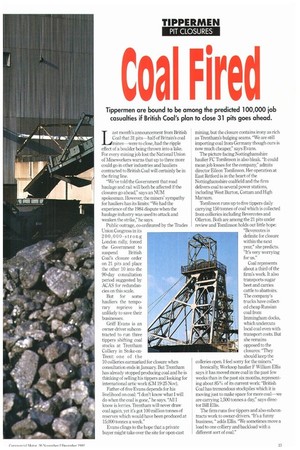Coal Fired
Page 25

If you've noticed an error in this article please click here to report it so we can fix it.
-1
ast month's announcement from British Coal that 31 pits—half of Britain's coal Jmines—were to close, had the ripple effect of a boulder being thrown into a lake. For every mining job lost the National Union of Mineworkers warns that up to three more could go in other industries and hauliers contracted to British Coal will certainly be in the firing line.
"We've told the Government that road haulage and rail will both be affected if the closures go ahead," says an NUM spokesman. However, the miners' sympathy for hauliers has its limits: "We had the experience of the 1984 dispute when the haulage industry was used to attack and weaken the strike," he says.
Public outrage, co-ordinated by the Trades Union Congress in its 200,000-strong London rally, forced the Government to suspend British Coal's closure order on 21 pits and place the other 10 into the 90-day consultation period suggested by ACAS for redundancies on this scale.
But for some hauliers the temporary reprieve is unlikely to save their businesses.
Griff Evans is an owner-driver subcontracted to run three tippers shifting coal stocks at Trentham Colliery in Stoke-onTrent: one of the 10 collieries earmarked for closure when consultation ends in January. But Trentham has already stopped producing coal and he is thinking of selling his tippers and looking for international artic work (CM 19-25 Nov).
Father-of-five Evans depends for his livelihood on coal: "I don't know what I will do when the coal is gone," he says "All I know is lorries Trentham will never draw coal again, yet it's got 100 million tonnes of reserves which would have been produced at 15,000 tonnes a week."
Evans clings to the hope that a private buyer might take over the site for open-cast mining, but the closure contains irony as rich as Trentham's bulging seams. "We are still importing coal from Germany though ours is now much cheaper," says Evans.
The picture facing Nottinghamshire haulier FC Tomlinson is also bleak. "It could mean job losses for the company" admits director Eileen Tomlinson. Her operation at East Retford is in the heart of the Nottinghamshire coalfield and the firm delivers coal to several power stations, including West Burton, Cottam and High Marnam.
Tomlinson runs up to five tippers daily carrying 150 tonnes of coal which is collected from collieries including Revercotes and 011erton. Both are among the 21 pits under review and Tomlinson holds out little hope: "Bevercotes is definite for closure within the next year," she predicts. "It's very worrying for us."
Coal represents about a third of the firm's work. It also transports sugar beet and carries cattle to abattoirs. The company's trucks have collected cheap Russian coal from Immingham docks, which undercuts local coal even with transport costs. But she remains opposed to the closures: "They should keep the colleries open. I feel sorry for the miners."
Ironically, Worksop haulier F William Ellis says it has moved more coal in the past few weeks than in the past six months, representing about 85% of its current work: "British Coal has tremendous stockpiles which it is moving just to make space for more coal—we are carrying 1,500 tonnes a day," says director Bill Ellis.
The firm runs five tippers and also subcontracts work to owner-drivers. "It's a funny business, "adds Ellis. "We sometimes move a load to one colliery and backload with a different sort of coal."












































































